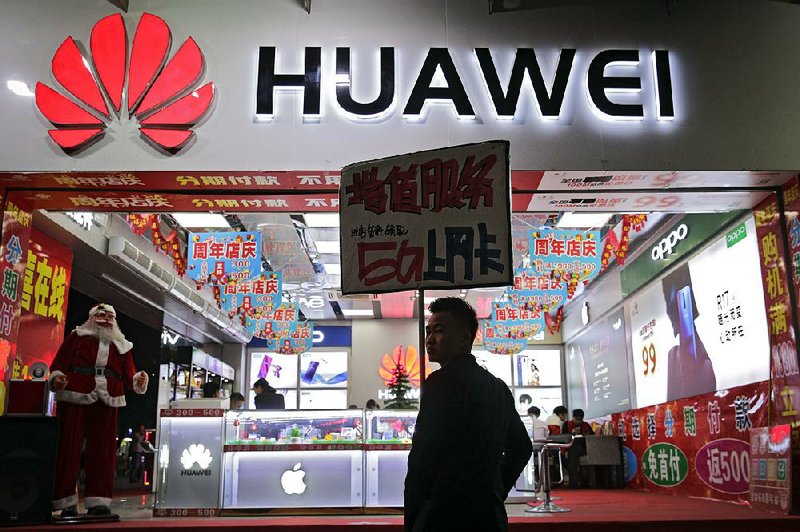DONGGUAN, China -- The chairman of Huawei on Tuesday challenged the United States and other governments to provide evidence for claims the Chinese tech giant is a security risk, as the company launched a public relations effort to defuse fears that threaten its role in next-generation communications.
Talking to reporters who were invited to Huawei Technologies Ltd.'s headquarters, Ken Hu complained that accusations against the biggest global maker of network gear stem from "ideology and geopolitics." He warned that excluding Huawei from fifth-generation networks in Australia and other markets would hurt consumers by raising prices and slowing innovation.
Australia and New Zealand have barred Huawei in 5G networks on security grounds. They joined the United States and Taiwan, which have broader restrictions on Huawei. Japan's cybersecurity agency says suppliers including Huawei that are deemed high-risk will be excluded from government purchases.
The curbs have had little effect so far on Huawei, which says global sales are on track to top $100 billion this year. But the normally press-shy company's decision to hold Tuesday's event appeared to reflect growing concern the accusations could hurt it in an emerging 5G market that industry analysts say could be worth $20 billion a year by 2022.
Hu, who appears at industry events but rarely gives interviews, talked for two hours and 20 minutes with American, European and Asian reporters.
"If you have proof or evidence, it should be made known," said Hu. "Maybe not to Huawei and maybe not to the public, but to telecom operators, because they are the ones that buy Huawei."
Huawei, founded in 1987 by a former military engineer, rejects accusations that it is controlled by China's ruling Communist Party or designs equipment to facilitate eavesdropping. But foreign officials cite a Chinese law that requires companies to cooperate with intelligence agencies and express concern that telecom-equipment suppliers might be required to modify products.
The emergence of 5G has heightened those fears. The technology is meant to support a vast expansion of telecoms networks to connect self-driving cars, factory robots, medical devices and power plants. That has prompted governments increasingly to view telecom networks as strategic national assets.
"There has never been any evidence that our equipment poses a security threat," said Hu. He added later, "We have never accepted requests from any government to damage the networks or business of any of our customers."
Hu's comments echoed previous denials by company spokesmen. But they marked the first time such a senior figure has directly addressed foreign security complaints, underscoring the company's sensitivity to them.
Huawei suffered another setback when its chief financial officer was arrested Dec. 1 in Canada in connection with U.S. accusations the company violated restrictions on sales of American technology to Iran.
Hu said he couldn't discuss the Iran accusations because the executive, Meng Wanzhou, is in the midst of court proceedings in Vancouver, British Columbia. Meng, the daughter of Huawei's founder, Ren Zhengfei, faces possible U.S. charges of lying to a bank to conceal Huawei's dealings with Iran.
Another Chinese company, ZTE Corp., was nearly forced out of business this year after Washington blocked it from buying U.S. components and technology because of the company's exports to Iran and North Korea. President Donald Trump restored access after ZTE paid a $1 billion fine, replaced its executives and hired U.S.-selected compliance managers.
Huawei has a workforce of 180,000 and China's biggest corporate research-and-development budget. It operates in 170 countries and dominates developing markets in Asia, Africa and Latin America.
The company is also China's first global tech competitor, making it politically important to a ruling Communist Party that wants to transform the country from a low-wage factory into a leader in fields from robotics to clean energy to biotech.
In Beijing on Tuesday, Chinese President Xi Jinping delivered an unabashed defense of his policies, using a key anniversary to argue that his recipe of guided growth under strong Communist Party control must not waver.
Xi made his case to some 3,000 officials and guests gathered in the Great Hall of the People to commemorate 40 years since China embarked on far-reaching economic changes after decades of upheaval and malaise under Mao Zedong.
The resonant date had inspired expectations among some analysts and investors that Xi would give clearer priorities to counter economic headwinds and trade tensions that have flared with the United States. But he offered none, referring only obliquely to the economic and diplomatic challenges confronting China.
Instead, he used the meeting, broadcast live on Chinese television, to stress that only the party's dominance would allow China to continue its transformation into the decades ahead. The first lesson from 40 years of changes, he said, was the need to maintain party leadership "over all tasks."
Xi's government has been forced to make some compromises with the United States as Trump's trade demands have escalated. But Beijing has also intensified corporate espionage and reacted with anger when U.S. prosecutors sought to extradite Meng from Canada. China quickly arrested two Canadians in apparent retaliation.
"China will never develop itself by sacrificing the interests of other countries" but also won't "abandon its own legitimate rights and interests," Xi said.
Information for this article was contributed by Joe McDonald of the The Associated Press and by Chris Buckley and Steven Lee Myers of The New York Times.
Business on 12/19/2018
